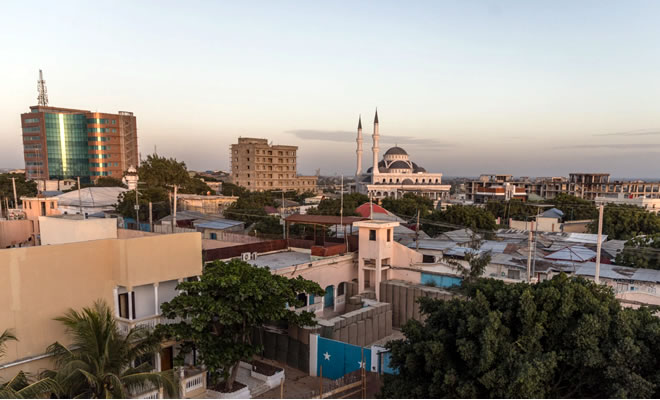
By Abdi Latif Dahir
Thursday May 6, 2021

Mogadishu, in January 2020.Credit...Brian Otieno for The New York Times
NAIROBI, Kenya (NY Times) — Days after Somalia’s president relented on plans to extend his term in office following street battles and international condemnation, his government announced Thursday that it would restore diplomatic relations with Kenya, ending a monthslong standoff that had injected an additional note of instability into an already-volatile region.
The Somali deputy minister of information said that Qatar had played a role in mediating between the two nations, and that the two sides would hold further talks in the near future on issues including trade and the movement of people.
The announcement, six months after Mogadishu severed relations with Nairobi, accusing it of “blatant interference” in its internal political affairs, came just days after tensions also ratcheted down on the domestic front.
Announcing the restoration of diplomatic ties with Kenya, the Somali Ministry of Information said in a statement, “The two governments agree to keep friendly relations between the two countries on the basis of principles of mutual respect for sovereignty and territorial integrity, noninterference in each other’s internal affairs, equality, cooperation and peaceful coexistence.”
Kenya’s government said Thursday that it welcomed efforts to normalize relations between the two countries.
The severance of diplomatic relations in December was provoked by a number of tensions, some new and some longstanding.
Most recently, in December, Kenya hosted the president of Somaliland, a breakaway region in the northwest that has yet to gain international recognition. Mogadishu also accused Nairobi of interfering in the electoral process in Jubaland, a region in southern Somalia where Kenyan troops are stationed as part of the African Union peacekeeping mission.
For years, the two countries have also tussled over a sizable area in the Indian Ocean, leading to a high-profile court case at the International Court of Justice that Kenya has boycotted.
The diplomatic tensions have also affected trade, with Somalia last year banning the import of Kenyan khat, a mild stimulant leaf that injects millions of dollars into Kenya’s economy.
And last month, Kenya’s announcement that it would close the Dadaab refugee camp, which hosts hundreds of thousands of Somali refugees, was seen by critics as a reprisal against Mogadishu, particularly over the maritime dispute.
For Somalia, the diplomatic row with Kenya came as it entered a tense election season in which President Mohamed, a onetime state official in Buffalo, N.Y., who returned to his homeland and began stoking nationalist passions, was accused of trying to hold onto power at whatever cost.
After talks with regional governments failed, in April Mr. Mohamed signed a document approved by Somalia’s Parliament that extended his term in office by two years — a move his opponents said he had orchestrated. That set off fierce fighting in the streets of Mogadishu that displaced between 60,000 and 100,000 people, according to the United Nations.
But last Saturday, Mr. Mohamed relented, asking the country’s prime minister to lead preparations for an election as lawmakers nullified his term extension.
On Tuesday, Mr. Mohamed spoke with the leader of Qatar, whose government he has depended on for financial and logistical backing. He also met with Mutlaq bin Majed al-Qahtani, Qatar’s special envoy for counterterrorism and mediation of conflict resolution. Mr. al-Qahtani, who spent three days in the country, also met with other major political leaders.
In an interview, Mr. al-Qahtani said that while the security situation in Somalia remained “fragile,” the decision to hand control of the electoral process to the prime minister was “an extremely positive step.” He denied accusations that Qatar was supporting Mr. Mohamed.
Mr. al-Qahtani, who arrived in Kenya and met with President Uhuru Kenyatta on Thursday, said it was “not in the interest of Somalia and Kenya to have a less stable region.”
“We hope this step will bring prosperity to the two neighboring countries, their people, and the region,” he said.
Declan Walsh contributed reporting.